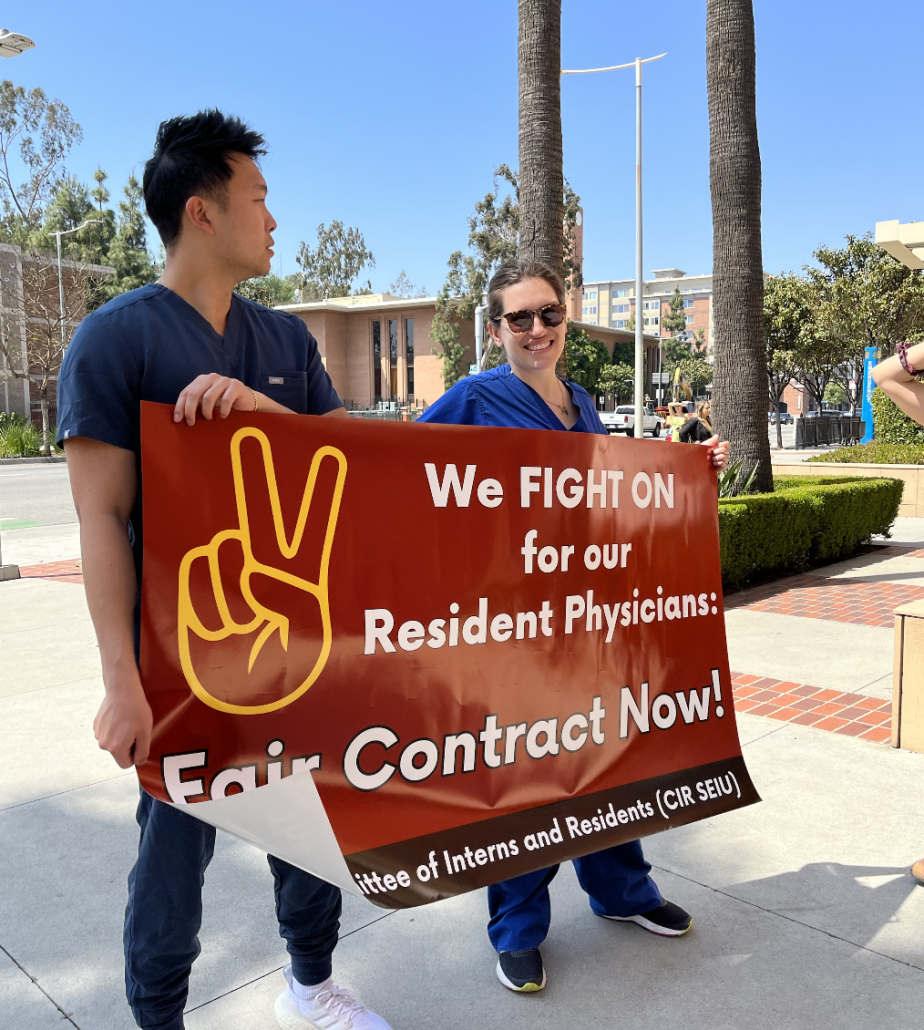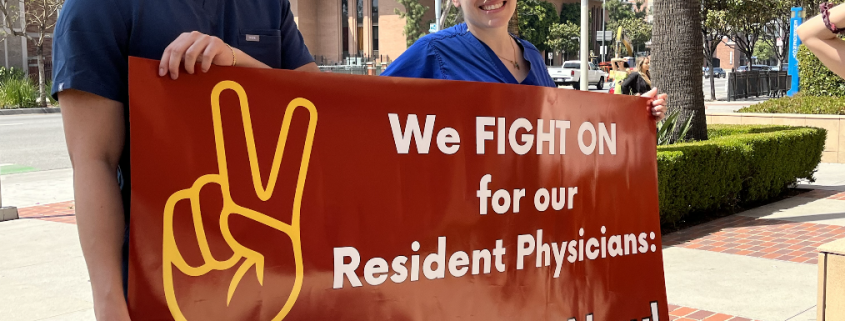L.A. General housestaff demonstrate at Keck graduation

Amid ongoing contract negotiations, six residents and fellows in the Los Angeles General program staged a flier demonstration at the Keck School of Medicine commencement ceremony Saturday afternoon. The housestaff, represented by the Committee of Interns and Residents/Service Employees International Union, sought to inform medical students and their families about the union’s effort for higher pay and benefits.
KSOM-employed residents and fellows — working rotations at Keck Hospital, L.A. General Medical Center and Cedars-Sinai, among several other hospitals — have been bargaining for their first contract since October following their unionization last May. The KSOM housestaff bargaining team hopes to attain comparable compensation to their L.A. County-employed counterparts. In November, CIR/SEIU filed an Unfair Labor Practice charge against KSOM after the school refused to match the wages and benefits paid to L.A. County-employed residents, who work the same jobs but receive, on average, $10,000 more.
Fliers passed out Saturday brought attention to the fact that medical students who’ll be KSOM-employed residents starting July don’t yet know how much they will be paid — because their contract hasn’t been decided and ratified.
“They don’t know what their housing stipend will be. They don’t know whether they’re going to get the same health care benefits as [L.A. County-paid] residents. They don’t know whether they’ll get parental leave,” said Dr. Frances Gill, a second-year psychiatry resident at L.A. General employed by L.A. County. “That’s because the Keck School of Medicine has been really stonewalling them in bargaining.”
The commencement ceremony seemed like a time to highlight the distinction in pay between the two groups of residents in the program, Gill said, and send a message to KSOM that “this just cannot fly.” Demonstrating residents handed out about 1,000 fliers to graduates and their relatives.
Six weeks of parental leave is a key proposal KSOM housestaff bargainers have tabled, but one that KSOM hasn’t wanted to budge on, Gill said. The Accreditation Council for Graduate Medical Education requires that sponsoring institutions provide housestaff with at least six weeks of medical, parental and caregiver leaves of absence. Gill said L.A. County honors this guarantee for its employees, but KSOM-employed residents want it written into their contract.
One of the bargaining team members and an OB-GYN fellow, Dr. Melissa Myo, said KSOM counter-proposed that sick and vacation days be combined to make up a parental leave instead of designating a separate leave.
“Essentially, it’s trying to figure out what is the bare minimum that they can write into the contract,” Myo said. “What happens if you get sick and you need to use those things? And the answer, of course, is that you go unpaid. And that just does not seem acceptable.”
KSOM-employed housestaff have also asked for increased health care benefits for residents and fellows to match that of their L.A. County-employed colleagues. Myo said her team proposed that KSOM implement a rebate system, which L.A. County has in place to buffer the cost of health insurance. L.A. County-employed residents and fellows are given a monthly sum to cover their premiums; what they don’t spend, they pocket.
“The answer that we received was, like, ‘No, we can’t do that,’” Myo said.
Myo said she’s heard from KSOM at the bargaining table that contracts for the many staff the school employs need to be comparable. But providing different health care benefits to KSOM residents and fellows than to KSOM administrative staff makes sense, she said, because they do different work and work different hours. Many residents, Myo said, are in the hospital up to 80 hours a week, and provide both patient care and training for medical students who come in for rotations.
Though she’s been involved in negotiations since they began in October, Myo may not see the pay and benefits she’s bargained for. If she graduates before a new contract is ratified — which may or may not happen before July, when new residents enter the program — she won’t “get any benefits out of the effort that [the team has] put in.”
“For the last year, we’ve just been unequally paid, and they will not entertain the idea of giving us back what we have been owed,” said Myo, referring to the gap in pay between KSOM- and L.A. County-employed housestaff following the latter group’s contract ratification last June, which included pay raises and an increased housing stipend.
For Myo, the action Saturday and contract bargaining are part of a bigger picture: She wants junior residents’ lives to be better when they enter their residency programs.
The housestaff also held a flier demonstration at the annual KSOM Match Day in March, where they similarly informed incoming housestaff about pay inequities between the two employers in the L.A. General program. Demonstrating and raising awareness about the negotiations, Myo said, has worked to “move things along.”
“If it falls off the place and people don’t see it happening anymore, they can get away with delaying stuff because no one is really looking,” Myo said. “In the future … being upset enough that we might threaten to strike is not off the table.”

